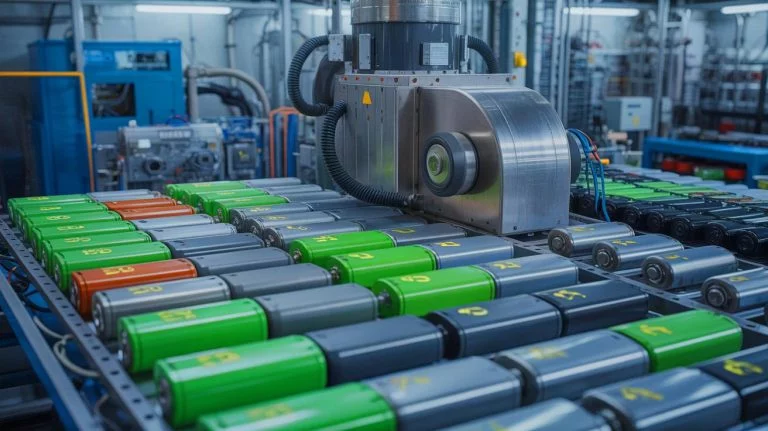| IN A NUTSHELL |
|
In an era where sustainability takes center stage, the recycling of lithium-ion batteries presents a compelling solution to address the growing demand for critical materials. As countries worldwide accelerate their transition to renewable energy, the need for effective storage solutions has never been greater. Lithium-ion batteries, known for their high energy density and scalability, have become a cornerstone of this energy revolution. However, the extraction of lithium and other essential materials like nickel, cobalt, and manganese poses environmental challenges. Researchers at Worcester Polytechnic Institute (WPI) have pioneered an innovative approach that promises to revolutionize battery recycling, making it both eco-friendly and efficient.
The Growing Need for Battery Recycling
Lithium-ion batteries are ubiquitous, powering everything from smartphones to electric vehicles and grid-based energy storage systems. Despite their versatility and efficiency, these batteries have a finite lifespan, typically lasting only a few years or a couple of thousand charge cycles. As more devices and vehicles rely on these batteries, the number of defunct units is set to rise sharply. This surge in demand for new components necessitates increased mining activities, which are environmentally detrimental. Recycling presents a viable solution, yet traditional methods have been energy-intensive and often fail to recover high-quality components. By addressing these challenges, recycling can significantly reduce the environmental impact of battery production and extend the life cycle of critical materials.
Innovative Hydrometallurgical Method
At the forefront of battery recycling innovation is a research team led by Professor Yan Wang at WPI. They have developed a hydrometallurgical method that recovers critical metals from spent lithium-ion batteries with remarkable efficiency. This process not only yields high-quality output but is also environmentally sustainable. The team successfully recovered 92 percent of critical metals from used batteries, transforming them into a cathode powder suitable for making new battery cathodes. This breakthrough method uses 8.6 percent less energy compared to conventional techniques and decreases carbon emissions by 13.9 percent. Such advancements underscore the potential of recycled materials to produce high-performance batteries, thereby reducing reliance on mining and mitigating environmental harm.
Performance and Environmental Benefits
The batteries produced from the recycled cathode powder demonstrated impressive performance, retaining 88 percent of their capacity after 500 charge cycles and over 85 percent after 900 cycles. This level of efficiency is crucial for meeting the demands of modern energy storage solutions. Moreover, the eco-friendly nature of the recycling process aligns with global sustainability goals by lowering energy consumption and carbon emissions. As Professor Wang highlighted, this work not only tackles the environmental challenges posed by battery waste but also strengthens the resilience of the battery supply chain. The ability to sustainably recycle and reuse materials at scale is a pivotal step toward building a more sustainable energy future.
Implications for Future Energy Solutions
The implications of this research extend far beyond immediate recycling benefits. By demonstrating the viability of creating high-performance batteries from recycled materials, WPI’s research paves the way for a more sustainable and resilient energy landscape. This innovative approach could significantly impact the way industries and governments perceive and implement recycling technologies. As the demand for energy storage solutions continues to grow, the ability to efficiently recycle and reuse battery components will be essential for meeting global sustainability targets. The research findings, published in the journal Energy Storage Materials, highlight the potential for a circular economy in the battery industry, where waste is minimized, and resources are continually reused.
As we move towards a future driven by renewable energy, the need for sustainable practices in battery production and recycling becomes increasingly critical. The research conducted by WPI offers a promising glimpse into a cleaner, more efficient way to manage battery waste and resource extraction. How will this innovative approach influence the future of energy storage and the global push for sustainability?
Did you like it? 4.6/5 (20)





This sounds like a game-changer! Can’t wait to see how it impacts the EV market. 🚗🔋
Is this process already being implemented at scale, or is it still in the testing phase?
85% power after 900 cycles? That’s impressive! How does it compare to traditional batteries?
Finally, a solution to battery waste! Thanks for sharing this hopeful news. 😊
Seems too good to be true. What’s the catch?
How much will this new recycling method reduce the cost of EVs?
Can this technology be applied to smartphone batteries too? 📱
Great initiative by WPI! Hope other institutions follow suit.
Does anyone know how long it might take for this to be commercially available?
Wow, 92% recovery of critical metals? That’s amazing!
What happens to the remaining 8% of unrecovered materials?
How eco-friendly is the hydrometallurgical process really?
Is this method cost-effective compared to traditional recycling?
85% capacity after 900 cycles is impressive. How does it hold up under extreme temps? 🌡️
Thank you, WPI, for leading the charge in sustainable technology! 🌍
Are there any potential environmental downsides to this new method?
I’d love to see more data on how this affects battery lifespan in real-world conditions.
Recycling that actually works? Finally! 🙌
Can this be applied to large-scale grid batteries as well?
Is there any information on the cost savings for consumers?
How does this method compare to other recent advancements in battery tech?
Looks promising, but let’s see if it lives up to the hype over time.
Does this technology also reduce dependency on cobalt mining?
What kind of impact could this have on the EV market if adopted globally?
Exciting times for battery tech! Can’t wait to see where this leads. ⚡️
What’s the environmental impact of the materials used in this new process?
Are there any known limitations or challenges with this new recycling method?
How soon can we expect this tech to be available in consumer products?
Is this the solution we’ve been waiting for to reduce e-waste?
Are there any patents involved, or is this open for further development by others?
This could be a huge step forward for renewable energy storage solutions.
Heard about similar tech in Europe, how does this compare?
Can this recycling method handle all types of lithium-ion batteries? 🔋